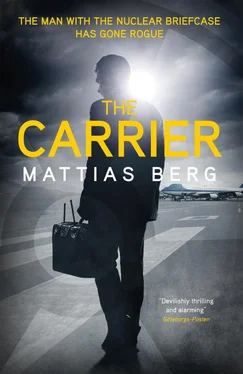Mattias Berg - The Carrier
Здесь есть возможность читать онлайн «Mattias Berg - The Carrier» весь текст электронной книги совершенно бесплатно (целиком полную версию без сокращений). В некоторых случаях можно слушать аудио, скачать через торрент в формате fb2 и присутствует краткое содержание. Город: London, Год выпуска: 2019, ISBN: 2019, Издательство: MacLehose Press, Жанр: Триллер, на английском языке. Описание произведения, (предисловие) а так же отзывы посетителей доступны на портале библиотеки ЛибКат.
- Название:The Carrier
- Автор:
- Издательство:MacLehose Press
- Жанр:
- Год:2019
- Город:London
- ISBN:978-0-85705-788-4
- Рейтинг книги:4 / 5. Голосов: 1
-
Избранное:Добавить в избранное
- Отзывы:
-
Ваша оценка:
- 80
- 1
- 2
- 3
- 4
- 5
The Carrier: краткое содержание, описание и аннотация
Предлагаем к чтению аннотацию, описание, краткое содержание или предисловие (зависит от того, что написал сам автор книги «The Carrier»). Если вы не нашли необходимую информацию о книге — напишите в комментариях, мы постараемся отыскать её.
The Carrier — читать онлайн бесплатно полную книгу (весь текст) целиком
Ниже представлен текст книги, разбитый по страницам. Система сохранения места последней прочитанной страницы, позволяет с удобством читать онлайн бесплатно книгу «The Carrier», без необходимости каждый раз заново искать на чём Вы остановились. Поставьте закладку, и сможете в любой момент перейти на страницу, на которой закончили чтение.
Интервал:
Закладка:
“We took our inspiration from the building of the underground train system in Moscow, all that monumental energy. Even this took its time, of course, years, half a decade of day-to-day work for many secret bus-loads of explosives experts and mining engineers from Kiruna: the most skilled of workers. And the basis for it was already there. A number of world-class facilities deep in the Scandinavian bed-rock, perfect for secrets and protection, not even the angels could reach there. All that was missing was a person with the right kind of spirited imagination. Or rather, two.”
Beyond her, I could make out parts of the apparatus, the out-of-date laboratory equipment. Everything seemed to be there as before, abandoned in a controlled flight, left neat and tidy. Or as if somebody had been there not long ago to clean up.
“But even all of this—years of tunnel construction, detonations every night, as far below the surface as a human being can bear to spend time without losing their senses—was just a means and not an end. The Inner Circle nothing more than a transportation system with a number of connected laboratories. As well as a way of making everything disappear, if that should prove necessary. Including ourselves and all our discoveries, the whole topography of secrets, the halls of mirrors. Into the same invisibility in which it had first been created.”
She shivered in the chill of the rock chamber. I handed her my blanket, which she at once wrapped around her own one. A cloud of breath rose toward the roof, like smoke from a dragon, as she continued.
“You understand, Erasmus, we had come a long way. Much further than the rest of the world realized. Sweden as a territory had, after all, been asleep: it had kept itself off the battlefield for more than 150 years. But during and after the Second World War, we had acquired hidden strengths. Real superheroes. Prominent nuclear physicists. Not just Lise Meitner and Manne Siegbahn, our own Nobel Prize winner, but also Glenn Seaborg—who was of Swedish descent and who retained a deep love of this country. All civilized countries have had scientific golden ages. That inexplicable accumulation of knowledge and talent in some lucrative field during a specific historical period, whether it be navigation or the petroleum industry. And this field was very much ours. But you know all that, my treasure. At least in theory.”
I thought I saw her playful eyes behind the bandages. It was the first hint since our unexpected reunion: that she and I had worked so closely, for so long, on my elusive dissertation. She acknowledged that I knew about the broader Swedish context. Nevertheless I did not react, let her lead on.
“I myself never really made the grade on the scientific side. But I had one god-sent gift: I could pull the wool over people’s eyes, society as a whole and the politicians, public opinion, whoever. My specialty was in that mental side of things. So I suppose my biggest contribution lay in keeping the secret secret.”
A sound came from the unlit part of the rock chamber, someone was moving in the darkness. My body tensed—but Ingrid kept going, regardless.
“For safety’s sake, we kept the management of the project not just within the Inner Circle, but to its very core. So there weren’t many who themselves knew the tunnels by heart. Had the entrance codes to the different sections, could follow the light-emitting diodes through the mass of the bed-rock, were aware of the structure of the whole labyrinth. Who didn’t just have instructions to follow—but knew the full scope of the project, both the tunnel system and the secrets within.”
Although a shape was emerging from the gloom, she wanted to finish what she was saying. And that needed just one more sentence.
“I should say there were two of us.”
When the Nurse joined us in our dimly lit part of the hall, she too was heavily bandaged. Not in one series of dressings over the whole of her head, like us, but in three separate bits. On the forehead, where the glass splinters from the lamp had penetrated. Under the eyes and around the mouth. The three sections were distinct from each other—I assumed because she still needed to be able to work without having her head draped in bandages, to make a series of incisions on herself, always maintaining some freedom of movement. Or perhaps because this particular Nurse seemed to do everything her very own way.
“I know, you should have got more rest. But Ingrid says that we don’t have the time. So this sure as hell isn’t going to be much fun, unless of course you’re funny that way.”
She ran a quick check on pulse, temperature, oxygen supply. Then the Nurse asked us to hold up our drips ourselves while she wheeled our bunks across the rock chamber, toward an almost invisible door. When one came right up to it, a small line could be discerned in the rough rock wall. I didn’t see the door handle at all until the Nurse pressed it down and I heard a muffled click. I gripped the briefcase harder, the cannula tight over the back of my hand. I felt my pulse quicken from that minimal exertion.
The chamber that we now came into was approximately fifteen feet by fifteen, and at least as high. I made out another metal bunk, X-ray equipment, an unwieldy defibrillator, needle destroyers, four portable spotlights, a hydraulic operating table, a full-length mirror and something that looked like an autopsy table made of tiles. Everything covered in the same red-gray coating as the equipment in the larger chamber. The atmosphere was heavy with the 1960s, the Cold War, the passage of time.
“What do you think, my treasure?”
I did not answer, didn’t even turn toward Ingrid. Tried with my limited field of vision to observe the Nurse on my other side: what she was going to do with us this time. Saw her start to dig around in her gigantic medical pack, while Ingrid picked up her story again.
“In these two laboratories, at the deepest point in the bed-rock, negative 308 feet, we studied the effects. On the dead and the living, humans and animals, short-term and long. The instant and eternity. Everything was so new for us, you see—and for the rest of the world. That’s the sole mitigating factor in our defense. We called them ‘Test Rooms’. What we thought of as military humor, Erasmus. You know: keeping things at arm’s length. Keeping them relative.”
Our psychologists always stressed how important it was, after our operations, to be as few as possible when the bandages were removed. Not to do the rounds, not to have unauthorized people about. In an ideal scenario only the doctor and the patient. To get over the shock of being confronted with someone different staring back at you from the mirror. And the whole monstrous side of it. The stitches like rails across your face, the seeping wounds, large bluish areas.
But now I was lying here in the bunk in front of the mirror, together with someone I knew nothing about, even what she was doing here, and wondering what she had made of my face. And with another person who could just as easily have been telling me fairy tales as telling me the truth.
She—Ingrid Bergman, or maybe Oskarsson, Ingrid—was the first one out. The Nurse maneuvered her higher against the bedhead, so she could see herself in the mirror. Undid the bandages, like a Christmas present, from the bottom up: chin, mouth, nose, eyes, forehead. I was already gaping far too much when the lower part of her face was uncovered. Felt the tear in the corners of my mouth as my stitches came undone under the dressings, one by one.
At least twenty years had been lifted from her. Under the grotesque bruising, there was little left of the mature Ingrid Bergman. No round face, no full mouth, nothing soft or spirited left at all. Instead she had acquired heavy eyelids and even higher cheekbones, thin lips, the mouth a straight line. The whole face had become younger, but also more severe.
Читать дальшеИнтервал:
Закладка:
Похожие книги на «The Carrier»
Представляем Вашему вниманию похожие книги на «The Carrier» списком для выбора. Мы отобрали схожую по названию и смыслу литературу в надежде предоставить читателям больше вариантов отыскать новые, интересные, ещё непрочитанные произведения.
Обсуждение, отзывы о книге «The Carrier» и просто собственные мнения читателей. Оставьте ваши комментарии, напишите, что Вы думаете о произведении, его смысле или главных героях. Укажите что конкретно понравилось, а что нет, и почему Вы так считаете.












